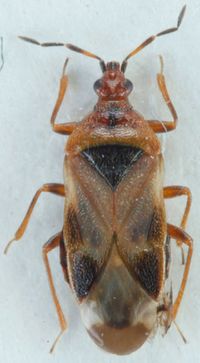Difference between revisions of "Anthocoris nemoralis (predator)"
From Pestinfo-Wiki
| Line 4: | Line 4: | ||
<font color="#008000">'''''Anthocoris nemoralis'' (predator)'''</font> (Fabricius, 1794) | <font color="#008000">'''''Anthocoris nemoralis'' (predator)'''</font> (Fabricius, 1794) | ||
| − | This small bug is an important predator of psyllids (e.g. see [[Biocontrol Science and Technology (2004) 14, 811-821|Shaltiel & Coll, 2004]]) and is produced commercially. The species is native to Europe and the Mediterranean region where it lives on trees and shrubs infested with psyllids and other soft-bodied insects. It has been introduced into North America in the | + | This small bug is an important predator of psyllids (e.g. see [[Biocontrol Science and Technology (2004) 14, 811-821|Shaltiel & Coll, 2004]]) and is produced commercially. The species is native to Europe and the Mediterranean region where it lives on trees and shrubs infested with psyllids and other soft-bodied insects. It has been introduced into North America in the 1960s against the pear psyllid (''[[Cacopsylla pyri]]'') and is now widely distributed there ([[American Entomologist (2004) 50, 18-30|Horton et al., 2004]]). |
[[Category:Anthocoris (genus - predators)]] | [[Category:Anthocoris (genus - predators)]] | ||
Latest revision as of 10:34, 27 August 2018
| Literature database |
|---|
| 36 articles sorted by: |
| • year (recent ones first) |
| • research topics |
| • countries/regions |
| • list of pest species |

Anthocoris nemoralis (click on image to enlarge it)
Author: Marko Mutanen, University of Oulu
Source: BOLD Systems
Author: Marko Mutanen, University of Oulu
Source: BOLD Systems
Anthocoris nemoralis (predator) (Fabricius, 1794)
This small bug is an important predator of psyllids (e.g. see Shaltiel & Coll, 2004) and is produced commercially. The species is native to Europe and the Mediterranean region where it lives on trees and shrubs infested with psyllids and other soft-bodied insects. It has been introduced into North America in the 1960s against the pear psyllid (Cacopsylla pyri) and is now widely distributed there (Horton et al., 2004).